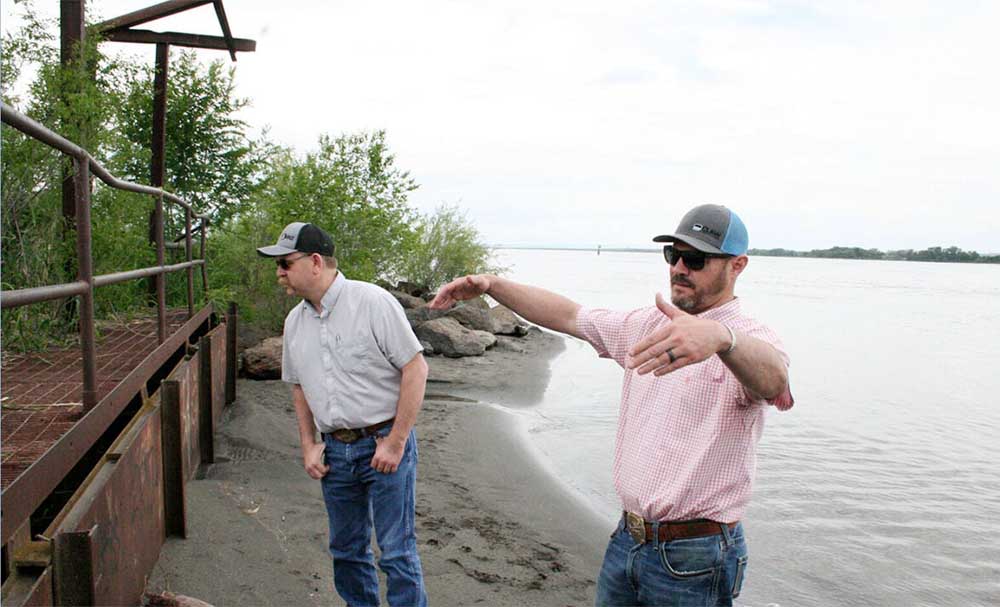Oregon’s reuse rules differ for Industrial, domestic wastewater
Published 7:00 am Thursday, June 6, 2024

- JR Cook, right, founder and director of the Northeast Oregon Water Association, and Gibb Evans, vice president of IRZ Engineering & Consulting, believe Oregon’s Department of Environmental Quality is too inflexible in regulating industrial water reuse in agriculture.
Wastewater reuse is subject to different regulations based on whether the effluent comes from domestic or industrial sources in Oregon.
“In rule, we see them very differently, primarily because of the different contaminants we encounter,” said Pat Heins, the state Department of Environmental Quality’s coordinator for biosolids and water reuse.
Trending
Water recycling in the state is limited to effluent that originates from domestic sources, while the DEQ treats water reuse solely from industrial sources as a separate regulatory category.
Industrial wastewater can be mixed with domestic wastewater and still fall under the state’s water recycling rules, according to DEQ. If the effluent comes exclusively from industrial sources, though, it’s regulated under separate groundwater protection rules.
With domestic effluent, disease is considered the main danger to human health, but “the sky is the limit” with pollutants potentially found in industrial wastewater, Heins said. However, the DEQ does use water recycling regulations to guide its oversight of industrial wastewater.
In Oregon, the most common source of industrial wastewater is from food processing, according to DEQ. Such waste can be land applied with a permit that’s mean to ensure crops absorb enough nutrients to prevent water contamination.
The DEQ has come under criticism for not regulating water reuse strictly enough — for example, in the Port of Morrow, where it’s been blamed for contributing to nitrate pollution of groundwater — but some in the farm industry believe the agency applies its rules too rigidly.
The agency’s rules would be more effective if they accounted for higher nutrient use by vigorous crops, versus those that are malnourished, said Gibb Evans, vice president of IRZ Engineering & Consulting, which is involved in reuse projects.
Trending
“Those two crops aren’t going to use the same amount,” he said.
The DEQ’s system for land-applying wastewater is too focused on average nutrient needs and not the actual demands of particular crops, he said.
In some circumstances, these limits impose an “artificial ceiling” that prevents crops from growing to their full potential and absorbing the maximum amount of nutrients, Evans said.
“Sometimes, putting less on is actually worse than putting on the proper amount,” he said.
The agency also prefers that farmers apply wastewater to deep-rooted crops, such as corn, wheat and alfalfa, rather than to higher-value crops, such as potatoes, onions and carrots, said JR Cook, founder of the Northeast Oregon Water Association.
The DEQ would rather farmers use crops with a deeper root zone because the agency believes it will reduce the chances of nutrient leaching, but it’s not as economically practical, he said.
“It minimizes the opportunity for the high-value shallow-rooted crops,” Cook said. “DEQ just does not understand agriculture.”
The DEQ has identified potential risks with wastewater reuse and determined food crops such as non-processed potatoes and onions must be irrigated only with water treated to the highest safety standard, said Heins.
Only eight facilities in the state out of 142 municipalities that use treated wastewater for irrigation are capable of meeting this requirement, he said.
Meanwhile, wheat, silage corn, alfalfa and other crops not intended for direct human consumption can be irrigated with lower-quality water, he said.
The DEQ’s limits are based on fertilization guidelines developed by Oregon State University, with different nutrient levels permissible based on when they’re applied during the growing season, Heins said.
Groundwater management areas, such as those with nitrogen concentrations that exceed human health standards, are regulated more strictly to prevent leaching, he said.
Farmers can supplement their crops with additional fertilizer or water but may then come under additional restrictions on irrigating with wastewater to protect groundwater, Heins said.
“As such, DEQ is conservative in authorizing recycled water with high nutrient concentrations to be used for general irrigation to ensure the protection of groundwater quality,” he said.








